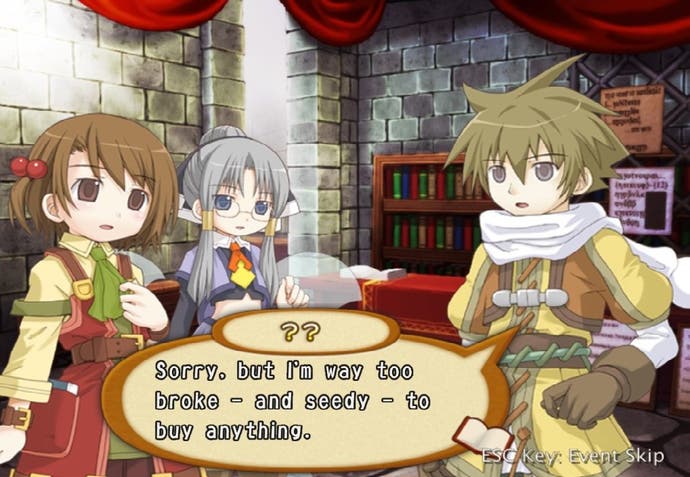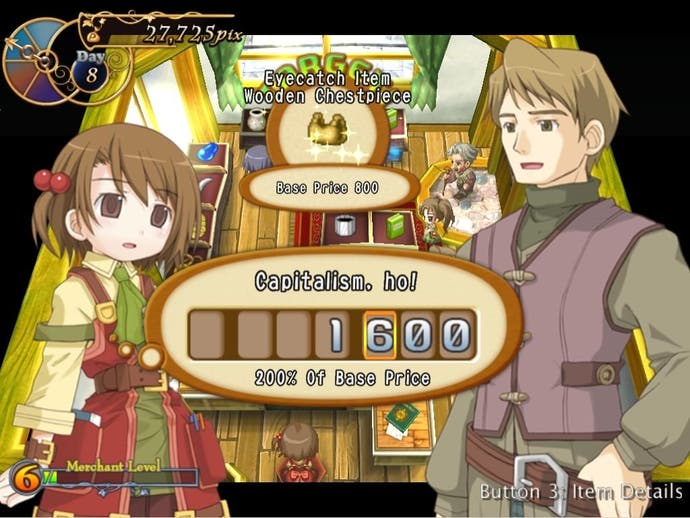Recettear: An Item Shop’s Tale
Shelf help.
What is Recettear? There's a good chance you have no idea, so I've put together the following cheat sheet. Don't worry, I'll have you sounding like a pro before you know it.
(1) Recettear is a lovingly crafted Japanese PC indie game made by EasyGameStation. It was recently lovingly translated by independent American localisation squad Carpe Fulgur, and is available on Steam for £12.99.
(2) The game casts you as Recette, a bumbling girl in a JRPG world that's deeply aware of its own absurdity. Your father runs off to be an adventurer, leaving Recette saddled with nothing but a house and a monster debt. The debt collector, an erudite fairy called Tear, suggests to Recette that they open a traditional RPG item shop and pay off the debt in smaller (yet still monstrous) weekly instalments. The game's catchphrase crisply sums up the duo's attitude to their situation: "Capitalism, ho!"
(3) It is absolutely not as twee or anime-like as the character art might suggest. It's a pacy, addictive, surprising experience that takes pleasure in holding your head in a barrel of financial opportunity and forcing you to breathe pure risk-reward. Fail, and the game over screen shows a sad Recette living in a cardboard box.
(4) It's pronounced "Racketeer".

After you've tapped your way through a few unnecessarily long tutorials, here's how an in-game day in Recettear might go.
First of all, you open for business. Your stock's looking good and you're feeling lucky. This causes a collection of customers to file in, the size of the crowd depending on the shopping experience you've been able to provide the public with.
Here, the fun starts. One by one, customers will come up and ask to buy something, or if you would like to buy something, or if you could recommend a certain type of item. Here, you make use of the game's rattlesnake-mean bartering system. You get two shots at offering a price acceptable to the customer, and then they walk out, losing you a sale.
Let's say an old man comes wobbling up, asking to buy an inordinately expensive pair of magical boots that have been gathering dust on your shelves for weeks. Brilliant! Capitalism, ho! Now, the pensioners of this town tend not to baulk at prices. 130 per cent of the boots' asking price of 18,000 pix would be a good starting point. But when you're dealing with an item this expensive, every percentile matters. You could go higher, 135 per cent maybe, bringing your offer to 24,300 pix. You do that. Click.

The codger baulks at your price. Now you only have one shot left to sell those boots, and it's a sale you want. 130 per cent might have seemed like a safe bet before, but what if this guy's stingy? You could go down to 120 per cent, maybe. 21,600 pix. But then you could be losing out on 2,000 pix worth of profit. How much do you need this sale? How much do you need the money? How much do you care about the old man liking you?
While this bartering system is the beating heart of Recettear, these kind of calculations don't actually take long. While you'll routinely come across transactions so important that they'll have you whimpering softly and chewing your knuckles, the above example would flow across your subconscious and be done in five seconds, leaving you either giddy or raging. Never mind though, here's someone else with another exciting proposition. Or maybe it's that sodding pauper girl again, asking if you have any cheap bracelets. This is the slot machine school of entertainment.
With one quarter of the day's time gone, your shop automatically closes up again. You could open it again, but your cupboards are looking a little bare, and nothing hurts the budding inner capitalist more than having to tell customers you're sorry, but you don't have what they're looking for. You leave the shop and head out into the world.

